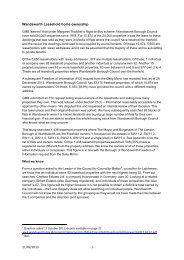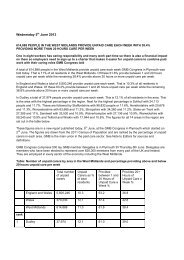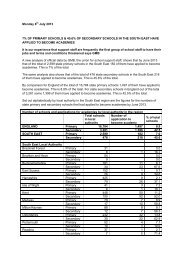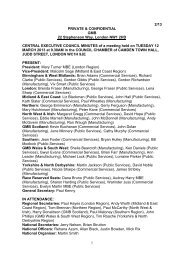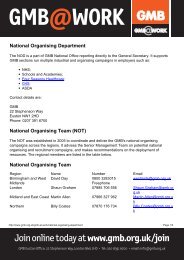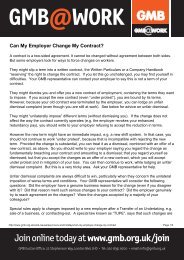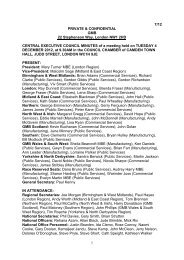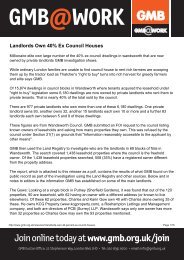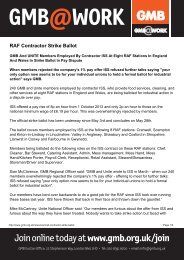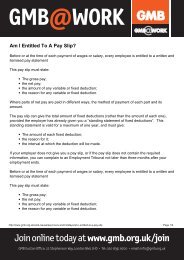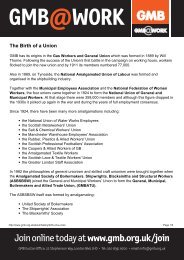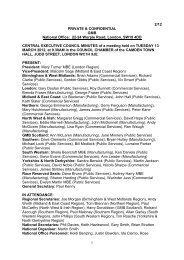WO toolkit 2012 complete.pdf - GMB
WO toolkit 2012 complete.pdf - GMB
WO toolkit 2012 complete.pdf - GMB
Create successful ePaper yourself
Turn your PDF publications into a flip-book with our unique Google optimized e-Paper software.
SECTION 5.32<br />
32. Am I entitled to receive warnings before i am dismissed?<br />
There is no general right to a warning before you are dismissed.That is why unions negotiate<br />
disciplinary procedures,to protect workers.<br />
If you qualify for protection against unfair dismissal,then it will usually be unfair to dismiss you<br />
without warning(see 35.How Long Must I Work Before I Can Complain of Unfair Dismissal?).Fair<br />
dismissal requires proper procedures and it is not proper to dismiss workers without warning.<br />
The main exception is where you are dismissed for gross misconduct–here you can be fired for a first<br />
offence and without any previous warning,provided there is a proper investigation and a fair hearing.<br />
Since 1 October 2004 every employer has to follow a minimum statutory‘dismissal and disciplinary<br />
procedure’(DDP).All employers must now provide employees with details of their disciplinary and<br />
grievance procedures.(Note: as of August 2007 the government is proposing to change these rules<br />
and the Most Asked Questions will be updated when the details are known).<br />
The procedures only apply to employees and not workers,so if you are an agency worker the procedures<br />
will not apply to you.The employer must use the procedure when s/he is considering:<br />
• Dismissal–the procedure applies not just to conduct or capability dismissals but whenever<br />
dismissal is contemplated.So it must be used for redundancy,compulsory retirement and when a<br />
fixed term contract expires; or<br />
• taking relevant disciplinary action–this means action short of dismissal which is based on your<br />
conduct or capability.However this does not include suspension on full pay or oral or written<br />
warnings so,for example,your employer need not follow the statutory DDP before issuing you with<br />
a final warning.<br />
Your employer must:<br />
• Give you a written statement of the alleged misconduct,poor performance etc and<br />
• hold a meeting with you to discuss the issue,and<br />
• inform you of any decision and of your right to appeal.<br />
You have the right to be accompanied by a trade union official or a fellow worker at both the original<br />
meeting and any appeal(see 31.Can I be Represented In a Disciplinary Hearing?).<br />
The procedure is modified if you are dismissed without notice or pay in lieu for gross misconduct,Here,<br />
the employer must give you a written statement of the alleged misconduct leading to your dismissal<br />
and provide a right of appeal.You have the right to be accompanied by a trade union official or fellow<br />
worker at the appeal meeting.<br />
If your employer dismisses you without following these minimum statutory procedures,you may be<br />
able to bring a claim for unfair dismissal.If so,the dismissal will be automatically unfair and the<br />
tribunal can award compensation of four weeks’pay(a week’s pay is limited to £310).Any claim must be<br />
made within three months of the dismissal.



